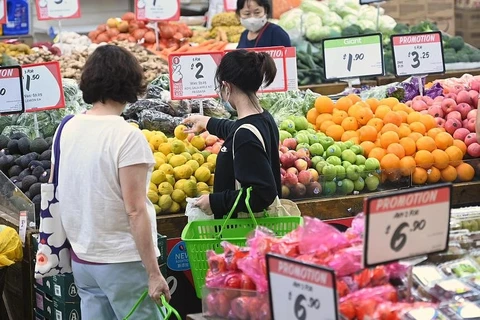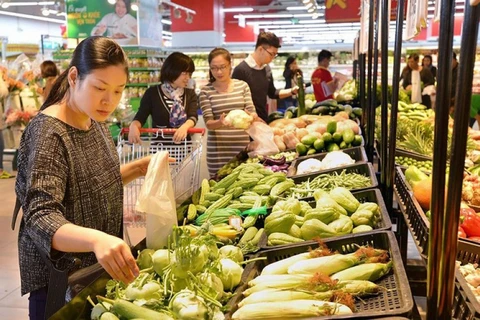 In September 2023, ten out of 11 key consumer goods and service groups increase in price compared to August 2023, only postal and telecommunications group fell by 0.23%. (Photo: VietnamPlus)
In September 2023, ten out of 11 key consumer goods and service groups increase in price compared to August 2023, only postal and telecommunications group fell by 0.23%. (Photo: VietnamPlus) Hanoi (VNA) – While many countries have high inflation levels, Vietnam continues to be in the group of nations with good inflation control as its September Consumer Price Index (CPI) went up only 3.66% year on year.
According to a recent report on the socio-economic situation from the General Statistics Office (GSO), CPI in September increased by 1.08%, with that in urban areas expanding 1.25% and rural areas 0.89%.
Among the 11 main groups of consumer goods and services, 10 saw price hikes compared to the previous month, with the postal and telecommunications services decreasing by 0.23%. Overall, the CPI in the third quarter rose by 2.89% over the same period last year and the nine-month figure rose 3.16%.
In the nine-month period, nine of the 11 categories of goods and services saw price hikes, particularly transport services with airfare surging 71.56% year on year, train services 31.26% and coach 8.33%.
Besides, the prices of education services picked up 7.28%, housing and construction materials 6.73%, food 4.85%, and drinks and tobacco 3.48%.
In the period, prices declined in two categories – petrol and oil 15.26%, and postal and telecommunications services 0.62%
Nguyen Thu Oanh, Director of the GSO’s Price Statistics Department, said that in the past nine months, the world commodity market was affected by complex economic, social, and political developments. Global trade standards and protection barriers increased while consumption remained weak. These conditions affect imports and exports, supply, demand and global prices. Global inflation is on a downward trend but remains high compared to the long-term goals of many countries.
Domestically, the supply of goods remained guaranteed. Agricultural- forestry- fisheries and service production prices in the third quarter and in the first nine months of this year saw an upward trend compared to the same periods last year. Industrial production fell, as did raw materials for production, exports and imports.
Oanh said that the world’s commodity market is volatile, influenced by the Russia-Ukraine military conflict, and economic competition between major powers. Many countries have maintained tight monetary policies, making aggregate demand weaken. In addition, major economies face low growth, with the financial and real estate markets posing risks.
On the other hand, extreme weather conditions continue to plague the globe, with widespread droughts, storms and floods, and natural disasters in many countries, causing imbalances in food production.
Global inflation from the beginning of the year has decreased gradually, after a period countries simultaneously raising interest rates to curb inflation along with falling energy prices.
 Vietnam continues to be in a group of countries with good inflation control as its CPI in September 2023 increased only 3.66% compared to September 2022. (Photo: VietnamPlus)
Vietnam continues to be in a group of countries with good inflation control as its CPI in September 2023 increased only 3.66% compared to September 2022. (Photo: VietnamPlus) Data from the GSO shows that inflation in the Eurozone in August increased by 5.2% over the same period last year, and 3.7% in the US. In Asia, the figure was 25.9% year-on-year in Laos, 5.3% in the Philippines, 3.4% in the Republic of Korea, 3.3% in Indonesia, 0.9% in Thailand and 0.1% in China.
Oanh added that the Government and the Prime Minister have drastically directed ministries to maintain macro-economic stability, promote growth, control inflation, and ensure major balances of the economy./.























